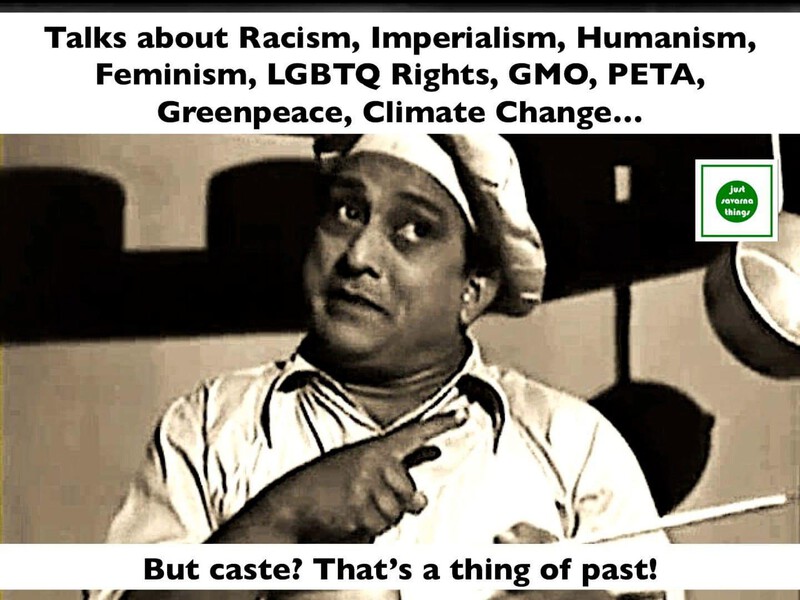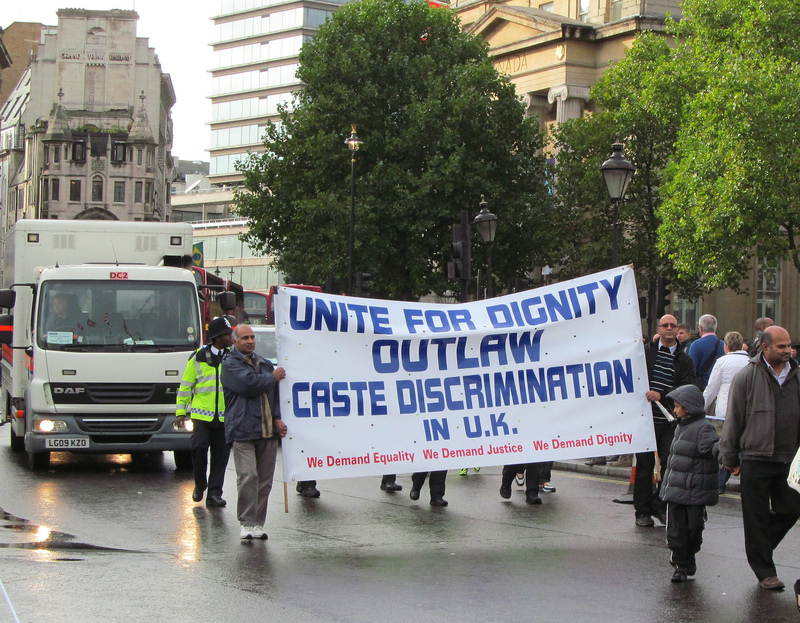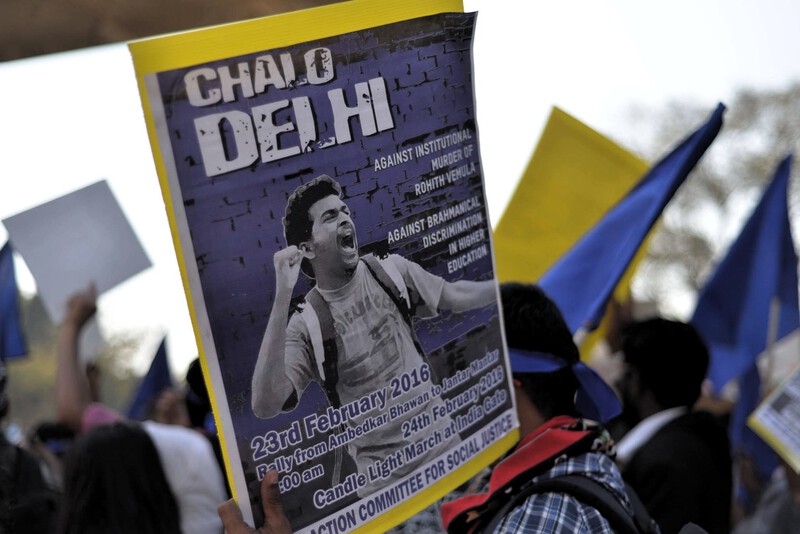Editorial – February 2016
Published on
Dr. B. R. Ambedkar had once said1 - It is usual to hear all those who feel moved by the deplorable condition of the Untouchables unburden themselves by uttering the cry, 'We must do something for the Untouchables.' One seldom hears any of the persons interested in the problem saying, 'Let us do something to change the Touchable Hindu.' It is invariably assumed that the object to be reclaimed is the Untouchables. If there is to be a mission, it must be to the Untouchables and if the Untouchables can be cured, untouchability will vanish. Nothing requires to be done to the Touchable. He is sound in mind, manners and morals. He is whole, there is nothing wrong with him. Is this assumption correct? Whether correct or not, the Hindus like to cling to it. The assumption has the supreme merit of satisfying themselves that they are not responsible for the problem of the Untouchables.
Casteism is not a Dalit problem. It is an upper caste problem. It is us - upper caste members (among the readers as well as among the members of CONCERN) - that need to be reformed, us that need to be sensitised. This is because Casteist discrimination perpetrated by upper castes arises from blindly following the moral dictates of those religious scriptures which sanction and perpetuate Casteism, from our lack of understanding of Casteism and from our unwillingness to see the way we perpetuate it - knowingly or unknowingly.
Even in the cases where we don't identify ourselves as being upper caste, even if we are irreligious / agnostic / atheist in beliefs, all of us born and raised in upper caste families have benefited from caste - privilege. This is unequivocally true irrespective of whether caste privilege is associated with economic privilege (most of the times) or not. While this does not demean the contribution from our individual hardwork or talent in the magnitude of our accomplishments, it points toward a much bigger contributing factor. It is the way we get better chances, access to resources and exposure because the graded inequality created by the caste system works in our favor in the form of privilege, whether we see it or not.
This privilege affects the way we view and understand ourselves, persons from other castes and our relationship with them. We rarely understand this privilege and its various manifestations, much less acknowledge it publicly. This is taught neither in schools, nor by our parents and is largely suppressed in the mainstream culture. Exploring our privilege, understanding it and acknowledging it, are crucial because these steps alone help us understand and prevent our role in the oppression of Dalit Bahujan members of the society.
Another reason this understanding is missing is that our privilege blinds us from it. Unlike Dalit Bahujans, we are not the victims of caste oppression and this fact gives us the luxury of ignoring caste identities whereas for them, it is reminded on a daily basis through the discrimination they face. In addition, privilege skews our lives deeply : it limits the spectrum of issues we focus on, the culture we get exposed to (media, books, films, music etc), the kind of food we eat, the social circles we spend time in and finally in the persons we marry. This is reflected in the matrimonial classifieds even in this digital age. A report estimates2 that only 5.3% of weddings in India happen out of caste and even lesser % of them are between Dalits and NonDalits. Even among liberal social circles in India, there exists a shadow of Casteism that ranges from silence on caste issues to the point of excluding Dalits from their spaces. For example, a parent of a Gay man recently published3 an advertisement in matrimonial classifieds seeking a groom for him, with a request - Iyer Preferred.

Figure 1: A post from Just Savarna Things exposing the hypocrisy of liberal Hindus regarding casteism
This caste privilege and the associated hypocrisies of uppercastes are brilliantly portrayed by a satirical page Just Savarna Things4 and are explored in other5 articles as well. If any or all of these posts irk you, we urge you to contemplate the reasons behind your discomfort and begin by reading the works of Ambedkar, Phule and Periyar among others. We, the members of CONCERN too have been evolving continuously in an understanding of our privileges. For instance, the Caste system is not a just hierarchy in which hardwork and talent will upgrade a person to higher castes. It is one that a person is born with and dies with. Additionally, Caste system is very deeply stratified at every level. As a result, all the castes that occupy the middle of the spectrum play the dual role of oppressors and oppressed simultaneously.
A deeper understanding of the issue is imperative because, in anti-caste struggles, like in most other struggles for rights, it is not helpful and is often counterproductive to merely have good intentions without an adequate understanding of the victims' perspective. Only when we fully understand the complexities of the Caste system through the lens of the victims, can we become true allies in the struggle towards annihilation of Caste.
The R word
Given the limited space, we can't cover all the aspects of reservation system in this edition. However, it should be remembered that Caste oppression has been in vogue for more than two thousand years, where in 100% of the jobs in all the sectors until Indian independence were reserved for upper castes, with shudras and untouchables forced to serve them. In comparison with that, reservations mandated by the constitution of newly independent India have lasted for less than 70 years and jobs are reserved for oppressed castes only in the organized public sector and not 100% of all the jobs, but the % of jobs reserved is in proportion to their share in India's population. This perspective must not be lost while discussing the issue.
Manifestations of Casteism
The worst manifestation of Casteism is in the form of Dalit massacres by upper castes. In the massacres of Kilvenmani6 (TN), Khairlanji7 (MH), Tsundur8 (AP) and Laxmanpur Bathe9 (BR) among others, groups of upper castes descended upon dalit bahujans - raping, murdering and setting their bodies and property on fire. This is but an extreme and clearly visible outcome of centuries old casteism that makes upper castes see Dalit assertion as an aberration against the natural order and use any existing trivial dispute as an excuse to restore the natural order through violence.
In addition to these mass murders, National Crime Records Bureau (NCRB) of India has recorded10 a steady rise in the individual cases of rape and violence against dalits, numbering to more than 47,000 in the year 2014 alone. These numbers are even more shocking if we add the number of such cases that often go unreported or in the instances where the police have refused to register the case.
Such horrific atrocities have repeated many times in India because the overwhelming majority of the personnel in the police & judiciary share this casteist outlook. This is reflected in the way the aftermath of these incidents - police investigation and the further judicial process - bore a clear dominating influence of Casteism at every step and thwarted justice to the victims' kith and kin. The role of caste in the investigative and judicial process after dalit massacres was exposed11 in detail by author Meena Kandasamy in a lecture - No one killed the Dalits.
This absolute impunity is further aided by the fact that even the other pillars of democracy - legislature, executive and the fourth pillar - media are filled with members that possess a casteist outlook whether they are conscious of it or not. As per a report12 there is not a single dalit or adivasi person in a list of over 300 decision-makers in the media.
In addition to violent attacks, dalit bahujans face13 discrimination in many aspects of their daily lives in various forms in professional and cultural spaces. In a study14, three identical resumes were prepared, one with an upper caste surname and the other two with Dalit and muslim surnames. These resumes were sent as applicants to advertisements for jobs in the private sector. For every ten resumes with the forward caste surname chosen for an interview, only six with Dalit surnames and three with Muslim surnames were chosen. While this is the situation at entry-level employment, even in the composition of boards of directors of corporate bodies, it is shown15 that 90.6% of the members belong to two castes only - Brahmin & Vaishya.

Figure 2: London, October 19, 2013: A demonstration to end caste discrimination
Casteism is so entrenched in our psyche that it is practised16 by Indians abroad as well. When Dalit associations protested against the same, UK government passed a landmark legislation17 in April 2011 that bans caste based discrimination and abuse. A plethora of such documented instances of Casteist discrimination & abuse burst the myth that caste is a thing of the past.
The recent suicide18 of research scholar Rohith Vemula at University of Hyderabad is but a direct result of discrimination he faced at every level from childhood, exasperated by casteist abuse of power by the university administration and the Ministry of Human Resource Development (MHRD). This abuse of power became evident once more when a committee constituted by MHRD gave19 a clean chit to MHRD and indicted the university administration alone.
In the last seven years, in the University of Hyderabad alone, nine research scholars have committed20 suicide and all of them were Dalits or were from backward castes. Such incidents will keep repeating in the future because the oppression is systemic. In 2011, Prof. Sukhdeo Thorat committee made21 recommendations to the University Grants Commission (UGC) to address discrimination in institutes of higher education and provided guidelines to nurture the careers of students and teachers who belong to marginalized communities. In the five years since the report was submitted, there is little to no response from most of the individual universities that come under UGC, a fact that did not propel the central governments - previous and current - into action.
This state of systemic oppression is best described by the term Brahminical Fascism which has a suffocating grip on all the pillars of Indian democracy as well as every nook and corner of popular culture. It should be noted that this term doesn't imply that the members of a single caste are fascists but denotes the entire mechanism and set up of casteist discrimination and the resultant power differential that is sustained and pepetuated by all the non-dalit members of society by their views, words and actions in their roles in different sectors of the country.

Figure 3: Delhi, February 23, 2016: Thousands marched in a rally demanding justice for Rohith Vemula
In such a society, the words22 of Babasaheb Ambedkar ring true even today - Turn any direction, Caste is the monster that encounters your path. You cannot have political reform, you cannot have economic reform, unless you kill this monster.
In such an overwhelming presence and influence of Caste, any analysis of Indian society should center around it. In a tiny step towards facilitating an understanding of Caste and the struggle to end casteism, we have brought this edition of Issues Of CONCERN that hopes to introduce an overall picture of Caste in India at a basic level to the readers. We hope this will be an enlightening and educative experience for the readers, just as it has been for all of us who were involved in its production. We wish you a thought provoking reading!
Image Credits
London, October 19, 2013: A demonstration to end caste discrimination -- by David Holt, released under the Creative Commons Attribution-ShareAlike 2.0 Generic license
Footnotes:
Meena Kandasamy – No one killed the Dalits https://www.youtube.com/watch?v=_jClj177b7k
Sukhdeo Thorat and Katherine S. Newman – Blocked by caste: Economic discrimination in modern India https://global.oup.com/academic/product/blocked-by-caste-9780198081692
Han Donker D Ajit, Ravi Saxena in the Economic and Political Weekly – Corporate Boards in India Blocked by Caste? http://www.dalits.nl/pdf/120811.pdf